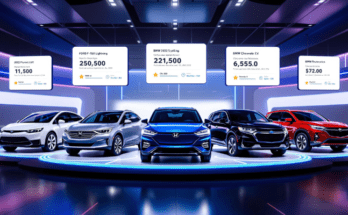Introduction
Over the recent past, the use of the vehicle tracking devices has grown rapidly across the market and commonly found in logistic transportation, fleet and personal uses. These gadgets include real time tracking and monitoring solutions, which can be used by companies and persons to get more out of their vehicles, protect them, and save money. Some trends that will likely come into focus within the next few years include a rising need for better innovations in the form of higher degrees of mobility, and more reliable vehicle tracking solutions that are a natural follow-on of the present trends in technological growth. In this article, information about trends, characteristics, and the future in use of real vehicle trackers by the year of 2025 will be provided.
Increase in Requirement of Real Time Monitoring and Reporting
Another trend observable in the case of vehicle tracking device market is the need for real-time tracking and analysis. It’s all today’s business environment requires is to be able to immediately know where the company’s fleet is, how it performs and its statutory state for a higher decision making and efficiency. Using GPS and cell based tracking gadgets, fixed in vehicles, helps organizations to track their vehicles in real-time that enables them to be alert in the eventuality of an incident, identify the most efficient routes, and increase the time vehicles are on the road.
It is therefore apparent that there has been emergence of advanced telematics solutions
The increased use of new and sophisticated telematics solutions is also another factor which has contributed to growth of the market for vehicle tracking devices. Telematics on one hand merges telecommunications and informatics that are very flexible with highly preserve features and functional features such as diagnosing vehicle, monitoring the driver behavior, and even concluding the control of vehicles in case of need. Multiple functionalities of advanced telematics solution enable the vehicle tracking devices to offer insights on the vehicle features like performance, the driving style, and fuel consumption to help businesses to work more efficiently, save money, and also keep the safety of the drivers in check.
Integration of AI and IoT
The usage of AI and IoT integration is predicted to bring extensive replacement in the vehicle tracking device market in the future years. Vehicle tracking devices with the integration of AI and IoTtechnology will be able to penetrate more deeper with the help of other features and services which are tailored to individual businesses and users. For example, natural language processing will make it easy for business entities to schedule maintenance tasks in advance through an AI-powered approach to reducing on vehicle down time and maintenance costs will also be reduced. Further it means that the vehicle tracking devices are to integrate with other IoT devices and systems because vehicles are to be connected with other connected devices and systems.
In the details, analysis could be made in the following three aspects, including Increasing Adoption in the Automotive Industry
There is also expectation that; automotive industry will also greatly influence future development of the vehicle tracking devices. Thus, important requirements such as electric and autonomous car tracking and monitoring will also turn into critical components as the use of such vehicles rise. Self-aware vehicles that incorporate sensors, cameras and analytics solutions embedded into the tracking devices will help car producers and fleet managers to monitor the performance and battery health of the car, and driver demeanor, to name but a few.
Growth of the Market of Individual Consumption
The development of personal vehicle tracking devices is also expected to increase in the following years because of the use of safety and security. For example, parents are fitting their teenage children with track and record the driving mode of the vehicle they are utilizing as a way of making sure their kids are safe on the road. Further, vehicle tracking devices are coming up in the market as car owners seek ways of safeguarding their vehicles against theft and where they get stolen they can easily be recovered.
RM Purpose and Risk Management: Regulatory and Privacy Concerns
It is anticipated that as the market for vehicle tracking devices progresses, so will concerns relating to regulation and privacy. As more organizations of all industries adopt the use of vehicle tracking devices, there is a high demand for the protection of data and privacy. Secondly, the regulation bodies for the purpose of violating privacy may restrict use of vehicle tracking device by the law.
Conclusion
In conclusion one can have idea that the market of vehicle tracking device is expected to grow and change its image in the next few years. As the need to track the location of vehicles in real-time rises, new features, telematics solutions, AI, and IoT features are also rising, making the tracking devices more innovative, efficient, and personalized, benefitting business and personal uses. This is because the automobile industry is quickly shifting toward electric and self-drive vehicles, making a smart tracking system crucial at such a time. The use of vehicle tracking devices may lead to some scandal concerning regulatory and privacy but the demand for safety, security, and operational use is expected to fuel the market for vehicle tracking devices upward. Vehicle tracking devices will surely be a key player in defining the future growth of transportation logistics by helping businesses and individuals better coordinate their utilisation of vehicles and ultimately improving their experience by 2025.



